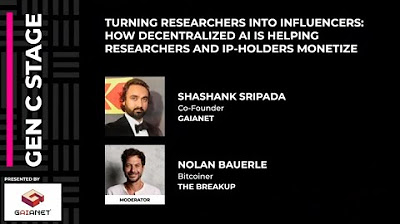Episode 1- Efficient LLM training with Unsloth.ai Co-Founder
Summary
TLDRIn this episode of 'Unsupervised Learning,' Renee interviews Daniel, co-founder of UNS, creators of the AI training system Sloth. They discuss how Sloth achieves 30 times faster fine-tuning for large language models, reducing memory usage by 50%. Daniel shares his background at Nvidia, where he optimized GPU algorithms, and how that experience influenced the development of Sloth. The conversation delves into the challenges and potential of language models, the importance of treating them as multiple agents, and the future vision of personal AI chatbots. Daniel also talks about the open-source community's role in UNS's growth and how they can support the project through collaborations and donations.
Takeaways
- 🚀 UNS (Unsupervised Learning) Sloth is an AI training system that accelerates fine-tuning of large language models by 30 times.
- 🌟 The open-source package from UNS has 3,000 GitHub stars and reduces memory usage by 50%, making fine-tuning twice as fast.
- 💡 Daniel's experience at Nvidia involved making algorithms run 2,000 times faster on GPUs, which influenced the development of UNS Sloth.
- 🏆 UNS Sloth was developed in response to the LLM Efficiency Challenge, focusing on training faster to achieve high accuracy.
- 🔍 The system rewrites the backpropagation algorithm in hard math and optimizes it for GPU code, leading to efficiency gains.
- 🌐 UNS Sloth supports training on various languages, not just English, and simplifies the conversion of models to different formats.
- 🤖 The team behind UNS Sloth uses AI, like Chat GPT, for engineering tasks and to overcome coding challenges.
- 📊 Language models have limitations in math due to tokenization issues, specialized training data, and their design not being focused on mathematical tasks.
- 📚 RAG (Retrieval-Augmented Generation) is a method for knowledge injection into language models, allowing them to search large databases for accurate answers.
- 🌐 Daniel's preferred sources for staying updated on AI include Twitter, Reddit, and YouTube channels like Yan's.
- 💸 UNS Sloth is currently bootstrapped, and they welcome community support through collaborations and donations via their GitHub page.
Q & A
What is UNS and how did it come to be?
-UNS (unsupervised learning) is an open-source package developed to make the fine-tuning of language models 30 times faster. It was created by Daniel, the co-founder, with the goal of reducing the time and memory usage required for fine-tuning, making it more accessible and efficient.
How does UNS reduce memory usage during fine-tuning?
-UNS reduces memory usage by 50% by optimizing the kernels in Triton language and rewriting the entire backpropagation algorithm in hard maths, which allows for more efficient memory management and faster processing.
What was Daniel's role at Nvidia and how did it influence UNS Sloth?
-Daniel worked at Nvidia with the goal of making algorithms on the GPU faster. His experience in writing Cuda kernels and optimizing algorithms was applied to UNS Sloth, where he rewrote the kernels in Triton language and performed extensive code optimizations.
What is the significance of the Triton language in UNS Sloth?
-Triton language is used in UNS Sloth for its performance and efficiency benefits. It allows for the creation of optimized kernels that improve the speed and memory usage of the fine-tuning process.
How does UNS Sloth address the language limitations of models like MESTRO and LLaMA?
-UNS Sloth allows users to fine-tune open-source models like MESTRO and LLaMA in any language, not just English. This overcomes the limitation of these models being English-based and enables training in languages like Portuguese or Mandarin.
What are some of the challenges with language models in performing mathematical operations?
-Language models often struggle with mathematical operations like multiplication and addition due to tokenization issues and the specialized nature of math problems. They may not have seen complex formulas in their training set, which limits their ability to perform certain mathematical tasks.
How does Daniel envision the future of UNS Sloth?
-Daniel's vision for the future includes a fine-tuning bot on every computer, even those with weak GPUs. This bot would read personal data, perform fine-tuning daily, and learn about the user to become a personal chatbot, making AI more accessible and personalized.
What is RAG and how does it enhance language models?
-RAG (Retrieval-Augmented Generation) is a knowledge injection system that allows language models to search large databases, like Wikipedia or the internet, to find correct answers. This enhances the model's ability to provide accurate and up-to-date information.
How does Daniel stay updated with the latest developments in AI?
-Daniel uses Twitter for new releases, Reddit for the latest information, and YouTube for educational content. He particularly recommends Yan's YouTube videos for staying up-to-date with AI developments.
How can people support UNS and contribute to its development?
-Support for UNS can come in the form of contributions to their open-source package, feature requests, or financial donations through platforms like Ko-fi (pronounced 'ko-fi' or 'coffee'), which helps fund further development and implementation of new features.
Outlines

This section is available to paid users only. Please upgrade to access this part.
Upgrade NowMindmap

This section is available to paid users only. Please upgrade to access this part.
Upgrade NowKeywords

This section is available to paid users only. Please upgrade to access this part.
Upgrade NowHighlights

This section is available to paid users only. Please upgrade to access this part.
Upgrade NowTranscripts

This section is available to paid users only. Please upgrade to access this part.
Upgrade NowBrowse More Related Video

Using CHATGPT offline? How to use AI in B2B SaaS and lots more with Kyle Legare- Account Exec

Exploring the Value of Knowledge in Web3 | #Consensus2024 AI Summit Recap

This AI Could Save YOU Millions $$ —Here’s How!

A Day in the Life of a Machine Learning Engineer (at a *small* startup)

Machine Learning Specialization on Coursera | Review

Dylan Field live at Figma's Config: Intuition, simplicity, and the future of design
5.0 / 5 (0 votes)